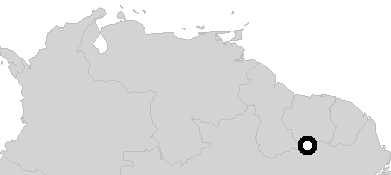
| www.CuriousTaxonomy.net |
|
The Flood in World Myth and Folklore
Northern South America |
| © 2021 Mark Isaak |

This flood reportedly occurred in relatively recent times. Its narrator said his grandfather was there.
A shaman gathered the people of the village and said to them, "Listen, eat well, dress well, and make drink, for I had a dream that a calamity is coming. So be alert and, when it comes, be courageous."
"But what will happen?" the shaman's son asked. "Tell us more."
"You must be good. If you do not give a good account of yourself, you will die. That's what the sky spirit told me. Which of you are good? If you are good, you will not perish."
The people left, still uncertain. When they had finished making drink, they gathered in the village square, and the shaman spoke again. "Who of you are married to their sisters? Who are married to their mothers? These marriages will cause us to perish. Because of these marriages, Kënekënekëimë is coming to destroy us. If you are married to your sister, you must leave her and take one whom you should marry."
Then the people gave away their sisters and mothers and took their proper women as wives. When it was all straightened out, the shaman said, "Okay, now it is as it should be. The catastrophe may be just a small one."
As the sun set, the people dressed themselves up, painted their bodies, decorated their faces. When nothing had happened by the next morning, they said, "The shaman cheated us! I'm going to get my wife back!"
Then the thunder and lightning came. The people, very distraught, started to dance. Rain came, long and heavy, and the river rose. "Dance!" yelled the shaman, "don't stop dancing!" It turned dark, but not completely dark. The flood came, and still it did not stop raining.
The sky spirits told the five shamans who were there to sing their spirit songs. The shaman who had had the dream told his grandson, "Listen well. This is the spirit song our ancestors sang at Kantani. Come, dance opposite me and learn it." The other four shamans also sang to stop the rain. That afternoon, the people ate together again. The water had stopped rising. The next morning, the shamans shot the water with their wooden arrows. "This was also done at the Kantani flood," they said. The water went down quickly.
Because the people obeyed, because they did not marry indiscriminately, Kënekënekëimë did not come down, and the people did not perish.
Cees Koelewijn and Peter Rivière, Oral Literature of the Trio Indians of Surinam, Koninklijk Instituut Voor Taal-, Land- en Volkenkunde, Caribbean Series 6 (Dordrecht Holland and Providence, USA: Foris Publications, 1987), 155-157.
